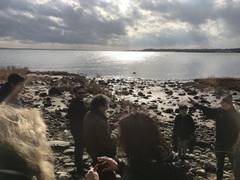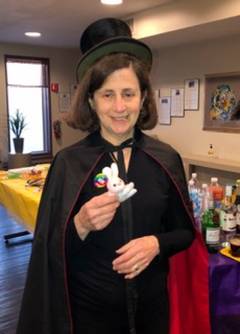Shemini Atzeret/Yizkor 5779: Unfinished Business
10/04/2018 06:37:12 PM
| Author | |
| Date Added | |
| Automatically create summary | |
| Summary |
In a way that only a free-thinking teenager can, Jake began to question religion and God, which was quite a challenge in a religious and Jewish setting like camp. But, in a testament to his decency and love of his friends, Jake kept coming back to camp and would sit quietly and respectfully during prayer services and the like. He was willing to watch his friends do things he didn't believe in just for the chance to be with them.
By the time we were high school seniors, we had already lost touch a bit. I heard second-hand that Jake had been diagnosed with cancer. As his mother tells it, “Jake, being Jake, fought back against Hodgkin's with the spirit of a warrior and the soul of a poet.” He kept up his martial arts and fitness routine during his treatments. His attitude was “in your face, cancer.” And, indeed, Jake beat that round of cancer. He finished high school and headed off to college, excited to study philosophy.
About a year later, though, tests revealed that Jake had acute myeloid leukemia, which sometimes occurs as a secondary disease to chemotherapy. The prognosis was poor. Jake was determined to beat back the cancer again, but he held no illusions about what the future might hold. Jake knew that he could not determine his fate for himself, but that he could choose his attitude in the face of his circumstances. “Jake's choice,” writes his mother, “was to fight back against cancer with the same humor, strength, style, and ‘stick it to the man' attitude that characterized his life, never forsaking the grin and the wink, the uncompromising love of argument, or the unerring sense of irony that made him who he was.”
Jake's treatments were long, painful and intense. But he faced them with the same determination and fighting spirit with which he approached everything. He even had an exercise bike and weights brought to his hospital room.
But despite his efforts, Jake's treatments failed. The doctors exhausted all of their options and Jake passed away. Jake was my first friend to die. I was thousands of miles away in Chicago when it happened, and I had to deal with my own grief and pick up the pieces with my group of camp friends. It was just awful.
As we gather today on this eve of Simchat Torah, we look forward to joyously concluding this year's cycle of Torah reading and beginning the next immediately. But in our joy, it's easy to miss the sad and even tragic way that the Torah concludes. Moses dies. Moses, who we have followed through his entire eventful life. Moses, who led the people through 40 years in the wilderness. Moses, who speaks for chapter after chapter of the book of Deuteronomy reviewing the lessons of the Torah. Moses dies. He dies just in view of the promised land, but not able to reach it.
It's a tragic story. It's tragic because of the unfulfilled potential of Moses' life. When God first encounters Moses, God already raises the notion that the people will not only leave Egypt but also journey toward, and settle in, the land promised to their ancestors (Exodus 3:8). And for the 40 years since that moment, Moses led the people on that journey. He coaxed them out of Egypt and dealt with crisis after crisis in the wilderness. But he was not to be the one who would take them into the promised land. Moses dies with the ultimate unfinished business.
Two unusual details mark the passing of Moses. First, unlike Abraham and our other earliest ancestors, Moses' burial place is anonymous. Moses' family, students and people are denied a place to go to remember him. Secondly, Moses dies at 120, and “his eyes were undimmed and his vigor unabated” (Deut. 34:7), which, our commentators explain, means that Moses did not show the normal signs of aging. These circumstances only compound the tragedy. Just as Moses did not live an ordinary life, he did not die an ordinary death. Those closest to him were denied the normal indicators of approaching death, and also denied the finality of burying him and paying respects at the grave. Moses simply disappears one day.
Given the tragedy of the situation, the people understandably mourn. “And the Israelites bewailed Moses in the steppes of Moab for thirty days. The period of wailing and mourning for Moses came to an end” (Deut. 34:8). Our commentators notice a difficulty with this verse. Why are we told that the period of mourning ended? We're already told that it lasted 30 days. Couldn't we have just assumed that it ended on day 30? Why does the Torah bother to tell us that the grieving period ended?
Our commentators resolve this problem by noting what immediately follows in the next verse: “Now Joshua son of Nun was filled with the spirit of wisdom because Moses had laid his hands upon him; and the Israelites heeded him, doing as the LORD had commanded Moses.” The Torah continues the narration with the transition of leadership to Moses' disciple Joshua.
From this juxtaposition, the commentator ibn Ezra infers that when the days of weeping in Moses' mourning came to an end there, only then did the Children of Israel heed Joshua. The people could not immediately continue with their collective project of entering the land of Israel. They needed time, a whole month, to mourn their loss before they could look to the future. It seems that Joshua realized this too. He let the people grieve before he tried to claim the authority given to him by Moses.
In a similar vein, the commentator Sforno notes that it was only after the 30 day mourning period was over that Joshua could be “filled with the spirit of wisdom,” for “during the days of weeping for Moses there was neither wisdom nor counsel.” The people, Joshua included, were at a total loss in the face of the death of Moses. They had no idea how to proceed without the only leader they had ever known. They needed time to grieve before they could move on. Had they tried to grin and bear it and immediately move into the promised land, they would have failed and only made things worse.
The Torah really ends, then, not with Moses but with Joshua. Joshua is the figure who will finish Moses' unfinished business. In fact, he gets a whole book that describes in detail exactly how he did so. Joshua, who had spend years learning from Moses, probably would have preferred to have his teacher with him. He probably felt a bit unsure or presumptuous in taking his master's place. But that was what the circumstances required, so that is what he did. Moses' memory is evoked many times through the Book of Joshua, mostly to bolster Joshua's authority, or to emphasize that instructions God gave through Moses are being carried out. But at the same time, the book depicts Joshua acting decisively on his own to help the people settle in to the land of Israel.
We are each the Joshua to the Moseses that we remember today. We are the people left behind to finish the unfinished business left behind by those who have passed from this world. Like Moses, most of those whom we remember left unfinished business. This is not the same as a regret. It is simply a project or a goal that remains yet to be achieved, or that required ongoing work to maintaining it. So if a person's primary goal in life was to raise a loving family, the unfinished work is maintaining good relations among the surviving relatives. If a person's deepest commitment was to a particular social cause or charitable institution, the unfinished work is continuing the fight or helping that institution remain vital. And if a person's most important work was to conduct him or herself according to certain values, then the unfinished work is to make those values more manifest in the world. Even people who live long, fulfilling lives leave unfinished business. All the more so those whose lives are cut short or are marked by disappointment and frustration.
So how can we be like Joshua? The crucial verse we discussed earlier points the way. We can't simply jump in to finish the unfinished business. As Seforno reminded us, there is no wisdom and no counsel to be found in moment of deep grief and mourning. We cannot simply move on immediately, even for the best of reasons. We need time to work through our grief. We need the intensive mourning practices, like shiva, that Jewish tradition offers us to work through our grief. And we need moments during the year�"at a loved one's yarzheit, and on holidays like this one�"to pause and remember those we have lost.
My friend Jake's parents were devastated by their loss. Jake was their only child, although they have since adopted another. But they and Jake's many friends were inspired by Jake's courage in the face of illness, and his dedication to not letting the cancer win. Jake's parents started a foundation in his memory to support pediatric cancer research, with the hope that other children and teenagers will not die long before their time as Jake did. They've chosen to focus their research on the most complex forms of cancer, and on novel but not yet proven ideas: the kind of ideas that are just crazy enough to work, but often have difficult attracting funding. Inspired by Jake's intellectual rigor and refusal to take no for an answer, they fund projects that “challenge the boundaries of established thinking and explore new frontiers of science and technology.”
Jake left behind an enormous amount of unfinished business. He had so much potential, and our world would have been immeasurably better off with whatever he would have chosen to do with his life. About a year ago I attended the wedding of two of my camp friends to each other, and when the old gang got together Jake's absence was felt. And of course, I'm sure his parents miss him every day. The foundation they started represents one small way to continue Jake's unfinished business, and I've been proud to support it over the years.
Our Torah ends with the tragic death of Moses. But after we read it, we turn immediately back (or forward) to the beginning, the creation of the world. Each death is also an opportunity for new beginnings, for new ways to continue, like Joshua, the unfinished business they left for us. As we pause now to remember those who have gone to their eternal rest, let us re-dedicate ourselves toward finishing their unfinished business.
Sat, October 25 2025
3 Cheshvan 5786
Photo Gallery
Photo Albums
Upcoming Events
-
Thursday ,
OctOctober 30 , 2025Coffee with the Rabbi
Thursday, Oct 30th 8:00a to 9:00a
Start your morning with some caffeine and casual or meaningful conversation! Join Rabbi Goldberg for a Coffee Chat! Stop by Rye Ridge Starbucks any of the following Thursdays, between 8-9am: June 12 and 26 July 10 and 24 August 7 and 21 September 4 and 18 October 16 and 30 November 6 and 20 December 4 and 18 -
Saturday ,
NovNovember 1 , 2025Dror Israel Shabbat
Shabbat, Nov 1st 11:30a
Dror Israel Shabbat Dror Israel’s Mirit Sulema, along with two leaders of the Arab Youth Movement NOAL, Tal Tunik and Shadi Habiballa, will speak during a Kiddush lunch about their important work with Arab Israeli youth and bringing Jewish, Arab, and Druze youth together. Saturday, November 1st, approx. 11:30am KTI Social Hall "We eat together, laugh together. We talk about what we think of each other, and what will help bring peace.” RSVP Appreciated -
Saturday ,
NovNovember 1 , 2025KTI Gala - A November to Remember Digital Journal
Motzei Shabbat, Nov 1st 7:00p to 10:00p
-
Saturday ,
NovNovember 1 , 2025KTI Gala - A November to Remember
Motzei Shabbat, Nov 1st 7:00p to 10:00p
Saturday, November 1, 2025, 7:00 PM - 10:00 PM Harrison Meadows -
Wednesday ,
NovNovember 5 , 2025Rabbi, May I? Modern Responsa
Wednesday, Nov 5th 10:00a to 11:30a
Wednesdays, 10 - 11:30 AM, KTI Library Ever since Abraham’s famous argument with God, Judaism has been full of debate. Moses and Korah, David and Nathan, Hillel and Shammai, the Vilna Gaon and the Ba’al Shem Tov, Spinoza and the Amsterdam Rabbis . . . the list goes on. No wonder that Judaism cherishes the expression machloket l’shem shamayim, “an argument for the sake of heaven.” Beyond their historical importance, what makes these disputations so compelling is that nearly all of them, regardless of their epochs, are still being argued. The parade of characters spanning three millennia of biblical, rabbinic, and modern disputation reflects the panorama of Jewish history with its monumental political, ethical, and spiritual challenges. This series will examine Jewish responses to exile from the biblical period to our modern day. Considering texts from all genres of Jewish literary creativity, we will explore how the realities and iterpretaions Join as we re-open these timeless debates that lead us to the core of 3,000 years of Jewish conversation. • Justice: Abraham vs. God (October 19) • Holiness and Authority: Moses vs. Korah (November 9) • Inclusion: The Five Daughters vs. the Twelve Tribes (November 30) • Accountability and Morality: David vs. Nathan (December 21) • Resistance: Ben Zakkai vs. the Zealots (January 18) • Law: Hillel vs. Shammai (February 15) • Spirituality: The Vilna Gaon vs. the Baal Shem Tov (March 15) • Boundaries: Spinoza vs. the Amsterdam Rabbis (April 19) • Religious Evolution: Geiger vs. Hirsch vs. Frankel (May 10) • Zionism: Herzl vs. Wise (May 31)
Privacy Settings | Privacy Policy | Member Terms
©2025 All rights reserved. Find out more about ShulCloud






